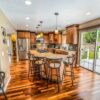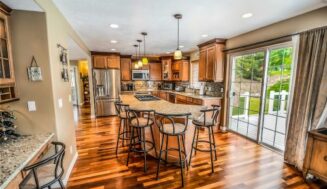Why Choose Energy Efficient Windows
Energy Efficient Windows are windows that reduce the amount of energy lost through the window. This is usually done by adding a reflective surface to one or more sides of the glass pane. The most common type of Energy Efficient Windows is double pane, triple pane, and even quadruple pane windows which have additional air pockets resulting in greater efficiency. Some types of Energy Efficient Windows also offer increased soundproofing, making them ideal for urban areas with high levels of noise pollution. Some people who live near power plants may choose Energy Efficient Windows because they wish to protect themselves from radiation without losing too much heat during the winter months. There are many factors that determine just how effective your Energy Efficient Windows will be, including local climate conditions and home insulation.
Energy-efficient windows are your first line of defense against unpredictable weather. The better insulated your home, the lower your energy bills, and the less you rely on unpredictable winter weather to heat and cool it! Your window installation will play a big role in whether or not you need additional heating or cooling in your home. As we all know, when it comes to comfort in our homes, it’s all about maintaining our indoor temperatures. That is why choosing energy-efficient windows that help maintain that comfortable temperature year-round can save you thousands of dollars each year. Choose energy-efficient windows for maximum efficiency and savings long term.
Double and Triple Pane
Double and Triple pane windows can greatly improve the energy efficiency of your home. The extra panes of glass offer increased insulation, resulting in lower heating bills during winter months and reduced cooling costs during summer months. Many double or triple pane windows also feature advanced frames that increase their soundproofing capabilities, making them an excellent choice for urban areas with high levels of noise pollution. Some types of Energy Efficient Windows are tintable, allowing you to change the color of your window while still enjoying the benefits of having multiple panes. Double or triple-pane windows may reduce the noise somewhat but they cannot eliminate it entirely; if you need to block out all noise consider adding a noise reduction window film to your Energy Efficient Windows.
Low-E and Argon Gas
Low-E and Argon gas-filled windows offer the best insulation and soundproofing available, but they also suffer from a significant drawback. They cost considerably more than other types of Energy Efficient Windows do. Low-E glass is specially coated so that it reflects heat when it is facing outside in the wintertime while still allowing light in during the summer months. This prevents heat from escaping or entering through your window which can help keep your home at a comfortable temperature all year round without using the heating or air conditioning system as much. These types of Energy Efficient Windows are usually fitted with argon gas rather than air pockets. Argon is a type of inert gas that does not conduct heat easily and helps to maintain the thermal resistance in your Energy Efficient Windows. This makes argon-filled Energy Efficient Windows an excellent choice for homes located in extreme climates during winter months as well as those that are prone to damage from earthquakes because the glass panes will stay intact even if there is an earthquake or other natural disaster that causes them to break.
Window Film
Window film can be added to any type of Energy Efficient Windows, including Low-E and argon filled models, offering comparable insulation capabilities at a much lower cost than other window treatments do. The most common types of window film make use of one or more layers of polyester which are coated with metal alloys. Window film is not detectable by the human eye and it can be easily removed if you ever need to replace your Energy Efficient Windows. While window film cannot block out the noise the same way that double or triple pane windows can, it can significantly reduce both noise levels and ultraviolet light. This makes it an excellent choice for homes near power plants where residents wish to protect themselves from harmful radiation while still enjoying their view of nature, as well as homes near busy intersections because it reduces traffic sounds.
Windows are the number one contributor to energy loss in a home, responsible for up to 35% of the hearing loss. Many people have double or triple glazing fitted to reduce the heat lost from their homes because it has been proven to be a cost-effective way of reducing your energy bills.
The issue with fitting double glazed windows is that they’re incredibly heavy and need special brackets, screws, and fixings that require drilling into your frames. For those who don’t own a drill, this can mean a call out to a tradesman which adds another expense on top of having them fitted in the first place!
Energy-efficient windows can reduce your heating and cooling costs by up to 40%. According to Energy Star, windows are responsible for 15% of your home’s utility bill. Given that most homes have 20 or more windows, this not only makes the windows an essential target for energy efficiency but also one of the best returns on investments you can get for your money.
You may be surprised to learn how much it costs overtime to heat and cool areas with large glass surfaces like windows. The following guide provides both short-term and long-term financial benefits of energy-efficient window treatments as well as tips on which products to look for when upgrading your old drafty windows!
The type of Energy Efficient Windows you use in your home has a tremendous impact on its overall energy efficiency, so make sure to take this into account when new windows for your home. For example, some windows have a lower U-factor than others. This is the most important of the five factors of windows used to measure their energy efficiency because it essentially measures how insulated they are. A less insulated window means more heat transfers through the window during winter, which costs you money for heating your home. But on summer days when you have your AC unit running full blast, low-U factor windows make your home hotter and increase its air conditioning bill.
Infographic Provided By Solar Panel Installation Company, Sunburst Solar
For more information, ask our experts on window replacements.
- Contrast or Complement: Finding the Perfect Furniture Colors for Dark Hardwood Floors - 15th February 2024
- What it’s Really Like to Work From Home - 19th September 2023
- Benefits of Using Storage When Moving House - 8th September 2023









